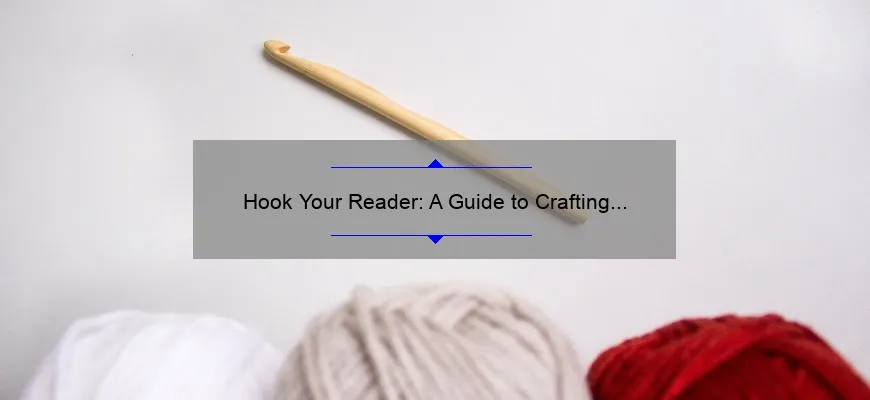Short answer how to write an essay hook:
An effective essay hook captures the reader’s attention and motivates them to continue reading. Use a startling fact, question, or quote as an attention-grabber. Introduce your topic clearly and connect the hook to the thesis statement for a cohesive introduction.
FAQs on Writing an Effective Essay Hook
Writing an effective hook is a crucial part of crafting any successful essay. A hook, simply put, is the opening sentence or two that grabs the reader’s attention and entices them to keep reading. It can be a daunting task to come up with a hook that will make your readers want to spend their valuable time diving into your writing, but fear not! In this blog post, we’ll break down some frequently asked questions on how to write an effective essay hook and provide tips on improving your hooks.
Q: What makes a good essay hook?
A: There are many different types of hooks you can use depending on the type of essay you’re writing. Some common strategies include:
-Starting with a quote from a well-known person.
-Pose an intriguing question.
-Make an interesting statement about the topic you will cover in depth later in the article.
-Shock readers by presenting surprising facts and figures related to your subject matter.
The possibilities are endless as long as they all serve one purpose: capture interest quickly so that your audience continues reading.
Q: Is it necessary for every essay to have a hook?
A: Yes! Regardless of whether you’re producing school work or tackling professional industry topics like science journals/blogs/articles etc., having enticing titles/ openers (i.e., your “hook”) can create initial appeal and encourage readers to stick around till end. Investment in this department shall only take few minutes considering what difference it can make from attracting people towards engaging them all throughout until closing arguments..
Q: Should I research general information before creating my hook?
A: While researching isn’t required for developing most hooks, sometimes gathering background knowledge before initiating helps produce more insightful results; for instance if you’ll be employing shocking statistics as hooks/introductory remarks supporting claims needs reliable data-driven reports/source material backing and access enough details important points providing adequate foundation materials can strengthen progression through drafts.
Q: Should I tailor my hook toward a specific audience?
A: Absolutely! Understanding your target readers is one of the most critical aspects needed for producing quality writing content, and hooks should be no exception. Therefore, usage of certain words or situations that can connect you to specific groups more effectively such as anecdotes or jokes based on similar backgrounds and shared experience serve the purpose well because they draw slight commonalities among group allows ease in comprehending ideas faster and building stronger relationships with whom are reading familiar territory .
Q: Is it effective to have multiple hooks throughout an essay?
A: While using different types of popular introduction strategies within write-up shows versatility sometimes utilizing many forces composition into being less coherent overall. It’s important not to overdo things; utilize singular appropriate grabber statement/statement follow through naturally until conclusion making more gracious connection between beginning to end instead drawing audiences away from main objective/main idea giving off school-like essay type vibe exceeding allowable entry length etc..
In conclusion, it’s crucial that writers understand how significant creating captivating openers is when looking to produce exceptional work resulting in higher engagement potential impacting readers greater than expected. Hopefully going forward these tips shall assist in mastering techniques related around perfecting first few lines— generating increased progress towards excellence etched out upon each typed letter or stroke inked page bringing everything desirable fruition achieving desired goals beyond expectations indeed!.
Top 5 Facts You Need to Know About Writing an Essay Hook
If you want to write an excellent essay that engages your readers and captures their attention from the very beginning, then you need to master the art of writing a killer essay hook. The hook is essentially the opening sentence or phrase that sets the tone for your entire essay and entices your audience to keep reading. It’s important that you get it right because without a strong hook, your readers may lose interest before they even get through the first paragraph.
Here are five critical facts every student needs to know about how to craft an effective essay hook:
1) A Hook Should Be Relevant To Your Topic
The most crucial element of any great hook is its relevance to your topic. It should be some kind of statement or question directly related to what you’re discussing in your paper. This approach helps ground the reader immediately in what they can expect next and establishes instant credibility.
2) Hooks Can Take Many Forms
While a lot of essays start with rhetorical questions like “Have you ever?” or startling stats, there many other types of hooks out there like anecdotes, short stories/microfiction, movie references, quotes, bold statements etc.. All these are valid if executed well but it’s best not use more than one otherwise it might seem overkill so choose wisely.
3) Make Sure Your Hook Grabs Attention
Your audience has likely read thousands upon thousands upon THOUSANDS(Woah!! I gt carried away!)of essays already – So chances are high they’ve grown accustomed to seeing similar set-ups when tackling various topics academically. For this reason alone, variety REALLY matters if intend on making lasting impact on them from that first sentence onwards! Not only does “great” infuses subject matter into our opening punchline make sense–if subtly done via diversifying word choice/structure styles/sentence lengths-potentially increasing engagement levels tenfold (or more). Intrigue will reward persistence by keeping their focus locked on your piece throughout each and every paragraph.
4) Use Interesting Language:
One of the secrets to writing a killer hook is using interesting language that captures the reader‘s attention. For example, instead of starting with something like “In today’s society,” try starting off strong by saying something more memorable and descriptive such as: “Once upon a time in our rapidly-evolving world…” or “Many moons ago when Technology was still in its bare-bones infancy…” These approaches could generate humorous/whimsical responses much easier than what one may expect just be sure you are keeping it according to topic standards.
5) Tailor Your Hook for Your Target Audience
Different essays will have diverse personalities which means it’s important to tailor & personalize essay hooks considering their desired target audience-So make sure they absorb all expectations readers come with so that from beginning an explicit transparency displayed resonates uniquely appealingly visual-wise at helping them connect organically without requiring too much effort or sifting through irrelevant details before finally connecting dots together!!
Conclusion
The bottom line when it comes to crafting great essay hooks is paying attention to both relevance/focus while being imaginative/original/showcasing clever wordplay. By utilizing these five strategies mentioned above along with stringing some fanciful phrases/thought-provoking strings fastened within opening statement undoubtedly increase chances of dazzling teacher/reader alike & kickstarting paper on points made!
Mastering the Art of Hook-Writing: How to Write an Essay Hook That Stands Out
It’s a well-known fact that when it comes to essay writing, the first few sentences can make or break your piece. We’ve all been there: staring blankly at a white screen, trying desperately to come up with an opening line that will grab the reader‘s attention and draw them into our argument.
That is why mastering the art of hook-writing is essential for any writer who wants their essays to stand out from the crowd.
So what exactly is a hook? A hook is simply a sentence or phrase that captures the reader’s attention and makes them want to keep reading. It should intrigue, entice, and pique curiosity – all in one fell swoop.
Now let’s dive right into some techniques on how you can master this skill:
1. Use anecdotes:
People love stories! An anecdote about yourself or someone else sets up an emotional connection between readers and writers; making it easier for them to stay hooked until they reach your conclusion section without being bored away by monotony.
2. Start with statistics
Statistic hooks not only add credibility but also catch attention immediately by putting figures upfront instead of beating around backgrounds leaving little space left for misunderstanding.
3. Rhetorical questions
Asking thought-provoking rhetorical questions work wonders in getting readers engaged from the start especially if followed shortly after outlined characteristics regarding subject matter backed by facts later on would be added advantages towards literary success goals
4. Use quotes
Quotes reinforce whatever claims one has put forward – adding authority over thoughts crafted leading towards more persuasive arguments as opposed focus misplacing unnecessary filler text lines taking time away from critical elements like introduction paragraphs et cetera regardless of topic matter!
5. Paint vivid pictures
Colors always fascinate humans- starting with scenes invoking emotional empathy helps paint picture braiding context rich descriptions while building rapport over controversial points raised relating within scope studied scenarios challenging typical polemic dialogue so far encountered till then further enriching experience following formal academic writing prescribed expectations.
In conclusion, a good hook is like a starring role in your essay‘s opening act. It sets the tone for what’s to come and leaves readers wanting more! With practice and these techniques mentioned above, you’ll be well on your way to mastering the art of hook-writing- an essential skill for any writer seeking success in their craft.

